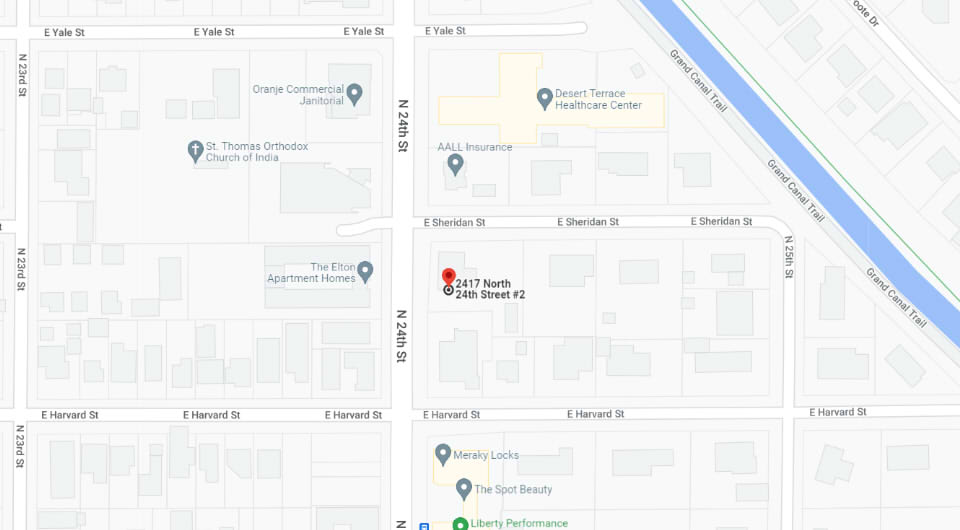The prison system in Arizona is not well equipped to offer inmates quality medical care. Intentional mistreatment of inmates, overworked medical staff, understaffed facilities, and stringent budget constraints can compromise patient care. Malpractice in prison health care can result in critical mistakes in patient care, along with preventable deaths, sicknesses, and associated injuries. If you or a loved one is a victim of prison health care malpractice, you need to seek the services of a skilled personal injury attorney to help you navigate the justice system. Our attorneys at the Phoenix Personal Injury Attorney Law Firm can investigate your case and help you seek the compensation you deserve.
Types Of Prison Health Care Malpractice
Inadequate healthcare is one of the significant issues in most prisons in the United States. Unfortunately, many inmates have died because of this negligence, and most cases have not been investigated. Freshly admitted inmates are susceptible to infections like hepatitis and HIV.
In the medical industry, standards of patient care do not fluctuate based on the patient's identity. Doctors and other health care providers should treat all patients from all walks of life and in all circumstances with respect and equal care. Medical experts must also observe strict federal statutes and responsibilities while treating patients, including those in jail or prison. Sadly, not all correctional facilities and practitioners fulfill these care responsibilities, resulting in medical malpractice. Typically, failure to offer proper medical care, also termed "medical malpractice," could include the following:
- Intentional misconduct.
- Substandard patient care.
- Medical product liability.
- Prescription errors.
- Medical administration errors.
- Anesthesia errors.
- Surgical errors.
- Lack of informed consent.
- Failure to treat.
- Delayed diagnosis.
- Failure to diagnose.
- Misdiagnosis of medical condition.
Any error or action that another medical expert would not have taken in a similar situation could form the basis for a medical malpractice claim. The actions could constitute patient abuse, harassment, discrimination, and neglect.
Intentional Misconduct
Intentional misconduct happens when a doctor or medical expert acts so carelessly and recklessly that he/she greatly endangers you and disregards your safety and well-being. Willful misconduct often constitutes a degree of willfulness, separating it from ordinary negligence. Intentional misconduct attracts severe legal repercussions for the liable party, given the emotional, mental, or physical consequences it can cause patients. Unlike general negligence, allegations of intentional misconduct are always severe in magnitude and can cost the liable party punitive damages.
Examples of intentional misconduct as prison medical malpractice could include the following:
- Intentionally causing harm to a patient without regard for the outcome.
- Making conscious medical decisions that do not meet standard care.
- Deliberate violation of safe medical procedures.
Substandard Patient Care
The concept of substandard care exists in most prison medical malpractice cases. Substandard patient care usually occurs when a doctor or medical expert fails to observe the correct standard of care when treating inmates. When a doctor is negligent or fails to adhere to this standard of care, it could lead to a medical error; and the doctor's actions could amount to substandard care.
Usually, the standard of care for health care providers is higher than the general standard of care. This is so because the job of a doctor or nurse requires sufficient expertise and preparation. Doctors in correctional facilities must carefully and professionally offer adequate care while treating inmates.
Medical Product Liability
A medical product liability lawsuit differs from a prison health care malpractice lawsuit. It is a case filed against a drug manufacturer, not a medical professional. However, it can be associated with prison healthcare malpractice if the doctor fails to inform you about options for treatment and the side effects of drugs. If you sustain an injury from a drug, you could file a medical malpractice lawsuit or a medical product liability lawsuit. Some of the medical products that can be defective include:
- Kidney dialysis filters.
- Breast implants.
- IUDS.
- Defibrillators.
- Most drugs like Darvon, Yasmin, Celebrex, and Oxycontin.
- Stents.
- Pacemakers.
- Hip and knee replacement parts.
Prescription Errors
Prescription errors and prescribing faults are common issues among medication mistakes. They happen in both prison healthcare systems and hospitals. They are rarely fatal, but they can affect your safety and quality of healthcare. Prescription errors involve writing the wrong prescription, while prescribing faults involve ineffective prescribing, overprescribing, and underprescribing, among others.
Anesthesia Errors
Anesthesia errors often occur because of human mistakes. Surgical rooms are busy with many things and decisions that must be made quickly. An anesthesiologist who does not understand your medical history could be liable for your prison health care malpractice injuries. He/she could also be responsible for your damages for failing to educate you on the risks associated with the surgery and other conditions. Some of the errors an anesthesiologist can make include:
- Allowing oxygen devices near hot surgical devices.
- Switching off warning alarms on essential equipment.
- Administering oxygen wrongly.
- Failing to react to adverse reactions to the medicine.
- Putting a patient under anesthesia for more extended periods.
- Insufficient or too much anesthesia.
- Administering anesthesia too late.
- Lack of communication in the surgical room.
- Giving the wrong explanation of the procedure and its requirements at any stage before, during, and after administering the drugs.
For regional and general anesthesia, the right combination of drugs in surgery can make the procedure easier for patients. Depending on the procedure, you will likely be immobile, and your skeletal muscles will be relaxed. You could also be unconscious and unable to remember what happened in the surgery room. However, any error by an anesthesiologist could have emotional, mental, and physical repercussions for you or even cause death. Failure to act or negligent action could lead to many complications, including:
- Anesthesia awareness.
- Severe brain damage.
- Stroke.
- Hypertension.
- Breathing in stomach content.
Surgical Errors
Surgical errors are also part of prison healthcare malpractice. Surgical errors occur because of the following reasons:
- Fatigue — This is common because most surgeons work for long hours. This makes the surgeon suffer fatigue, and he/she could easily make mistakes, unlike a well-rested doctor.
- Neglect — Some surgeons sometimes do not pay attention while operating on a patient because of distractions like talking to other medical staff.
- Alcohol and drugs — Some surgeons deal with their stress by consuming alcohol or drugs. A surgeon who enters the operating room under the influence of alcohol or drugs could make many mistakes that could be fatal.
- Poor communication — A surgeon can make critical errors if he/she fails to communicate properly. For example, errors can occur if the surgeon fails to ensure all the surgical equipment is properly sterilized and working properly or if the surgeon marks the wrong site for surgery. A doctor could also give inaccurate information on the dosage of the patient's medication.
- Incompetence — An inexperienced surgeon lacks the experience to perform surgery. Therefore, he/she is bound to make many surgical errors.
- Improper work process — Taking shortcuts while performing surgery can be costly. A surgeon can execute certain steps wrongly during surgery.
Examples of surgical errors that surgeons can make include the following:
- Operating on the wrong patient.
- Operating on the wrong body part.
- Leaving a piece of a surgical device in the patient's body, like sponges or instruments.
- Carrying out an incision at the wrong location.
- Administering too little or too much medication.
- Injuring a nerve during surgery.
Liability For Prison Health Care Malpractice
The party responsible for any medical malpractice or personal injury claim is the party that committed the act without which you could not have suffered injuries.
For example, you can prove liability by pointing out that if the doctor had followed the required standards of care in diagnosing you, you would not have suffered damages. If a medical professional fails to adhere to the required standards, he/she will be guilty of medical malpractice. According to the legal system, larger parties are usually vicariously liable for the actions of prison workers like doctors and nurses.
Without a personal injury attorney, it can be hard to identify the party responsible for prison health care malpractice. Several individuals could have played a role in your negligent medical care. This could include county and state workers and healthcare employees contracted independently by the correctional facility. It is always advisable, however, that you reach out to a personal injury attorney to help you identify the liable party before you file your malpractice lawsuit.
The Obligation Of Correctional Facilities Regarding Medical Care
Medical negligence and malpractice issues are commonly filed against nursing homes, hospitals, and other healthcare institutions. However, prisons and other correctional facilities also have a constitutional duty to provide medical care for incarcerated individuals.
Failing to provide essential health care services or inadequate medical care could amount to a breach of duty by those charged with the well-being of inmates in correctional facilities. Incarcerated individuals have a constitutional right to basic needs under the Constitution's Eighth Amendment. The basic needs could include shelter, food, and essential care. In some situations, some people also claim that deliberate indifference to a prisoner's serious medical care is cruel and unusual punishment.
Generally, the facts of your lawsuit will determine the proper legal action to take. An experienced personal injury attorney will evaluate your situation from a legal point of view and assist you in coming up with an appropriate strategy to seek compensation.
When To Seek Attorney's Services For a Prison Health Care Malpractice
Prison medical malpractice lawsuits constitute unique elements, making them hard to prosecute. Generally, medical malpractice is a practice area that is complicated even without extenuating circumstances associated with prisons, like violated constitutional rights and government liability.
Medical malpractice lawsuits require researchers, investigators, professional medical witnesses, and other experts to succeed in pursuing your compensation. The best way to win your case is to hire a skilled and competent prison medical malpractice attorney.
Damage Recovery In a Prison Medical Malpractice
Like other types of personal injury claims, you can pursue compensation for the damages you suffered from medical malpractice in prison. The damages could include:
- Wrongful death.
- Emotional distress.
- Pain and suffering.
- Loss of enjoyment in life.
- Lost wages.
- Loss of limb.
- Disfigurement.
- Corrective surgery.
- Cost of additional medical care.
Wrongful Death And Prison Health Care
Sadly, inmates often die untimely because of medical malpractice in correctional facilities. If your loved one dies because of prison health care malpractice, the law allows you to seek compensation and justice on their behalf. However, the law outlines the hierarchy of priority, which determines the survivors or parties that can file this type of lawsuit.
You are allowed under Arizona law to file a wrongful death lawsuit with other types of personal injury lawsuits. However, you should consult a personal injury attorney to help evaluate the full scope of your lawsuit's value and maximize potential compensation.
Emotional Distress
Emotional distress damages are a significant compensation component in medical malpractice lawsuits. The court could award you emotional distress damages for your injury's psychological impact on your daily life. If you suffer injuries from prison healthcare malpractice and file a successful personal injury case, the court can award you for your emotional distress. Emotional distress could manifest in different ways, including fear, anxiety, and sleep loss.
Keeping a daily diary or journal to record how you feel about the damages sustained due to prison healthcare malpractice is advisable. Gathering ample evidence of your emotional distress could build a stronger claim and give you a higher chance of recovering compensation. The amount you can receive for emotional distress depends on the unique facts of your case and the nature of your injuries.
Pain And Suffering
You could recover damages for pain and suffering if you suffered injuries in prison due to healthcare malpractice. Pain and suffering damages generally include compensation for having gone through emotional and physical pain and suffering. Calculating pain and suffering will be based on the severity of your injuries and the nature of prison healthcare malpractice. The judge often looks at the evidence you present in court to determine what is fair and just in light of your circumstances. For example, if you are permanently disabled because of healthcare malpractice, you could be entitled to high compensation.
Generally, you can prove pain and suffering in the following ways:
- Bringing your friends and relatives to testify about your pain and suffering and how the malpractice impacts your daily life.
- Presenting a comprehensive journal that describes how malpractice influenced your life, your pain scales, and your daily life.
- Presenting documentation about any disabling, life-threatening, or permanent conditions.
- Provide a complete list of medications your doctor prescribed following the healthcare malpractice.
- Provide any written notes or opinions from mental health experts about your condition and how it will continue to influence your life beyond a physical injury.
- Document all visits to the doctor, including mental health therapy sessions.
Loss Of Enjoyment In Life
Loss of enjoyment of life is one of the general or non-economic damages you can recover in a personal injury lawsuit. Loss of enjoyment of life typically refers to how a severe injury influences your quality of life. It is hard to prove a loss of enjoyment in life because it is not tangible. However, you can work with an attorney to help you evaluate your case and create a claim for compensation on your behalf.
The loss of enjoyment of life arises from the inability to do specific duties like you did before the prison healthcare malpractice, like playing sports or working. You can only be eligible for compensation under a personal injury lawsuit if the loss of enjoyment occurred because of pain, some loss of function, or other circumstances resulting directly from prison healthcare malpractice. Some of the injuries that can impair your ability to enjoy life include:
- Scarring and disfigurement.
- Loss of sight and hearing.
- Chronic pain.
- Spinal cord injuries.
- Brain injuries.
Lost Wages
You will likely not have the capacity to engage in any work after sustaining injuries in prison due to healthcare malpractice. This time out of work can negatively affect your future and everyday life. The law allows you to recover lost wages that you would have made if you had been able to work. Calculating your lost wages starts by multiplying your missed work by your hourly rate. You can obtain supporting documentation from your employer, including payslips and contract letters.
Statute Of Limitations For A Prison Medical Malpractice Lawsuit
According to Arizona law, the time limit for pursuing a prison medical malpractice claim is two years. However, this statute of limitations can be significantly reduced in certain situations. The state can limit your window to 180 days if you file a lawsuit against a public entity or worker. In a prison medical malpractice lawsuit, you will be filing a claim against a government entity, so a shorter statute of limitations will apply.
Your attorney could help you understand the applicable clauses in your situation. The attorney will also advise on the proper action to take to ensure you receive your deserved compensation.
Find a Medical Malpractice Personal Injury Attorney Near Me
When you are sentenced to jail time or imprisonment, you do not lose all your rights. You have a right to appropriate medical care and to have other basic needs met. You can file a prison healthcare malpractice lawsuit if your right to proper medical care is violated. The Phoenix Personal Injury Attorney Law Firm can help you seek compensation if you or a loved one suffers an injury from prison healthcare malpractice. Contact us at 602-641-9589 and talk to one of our attorneys.










